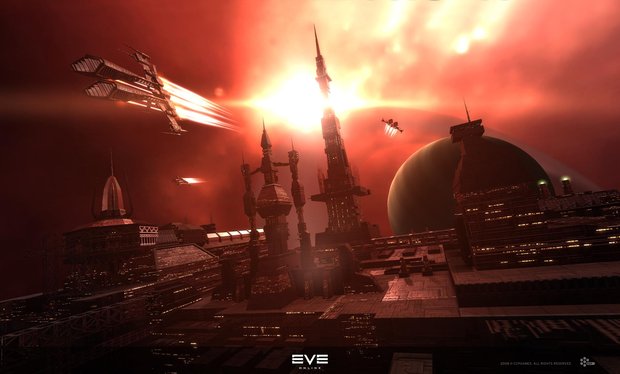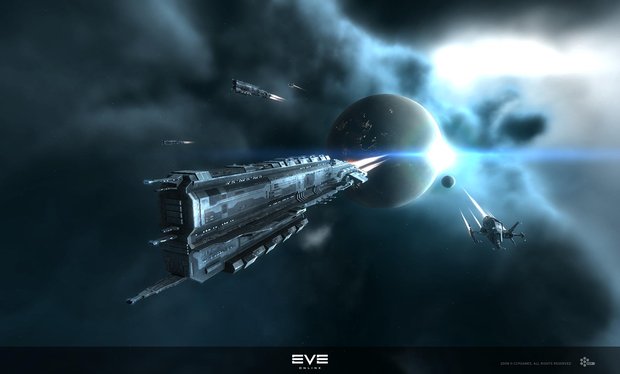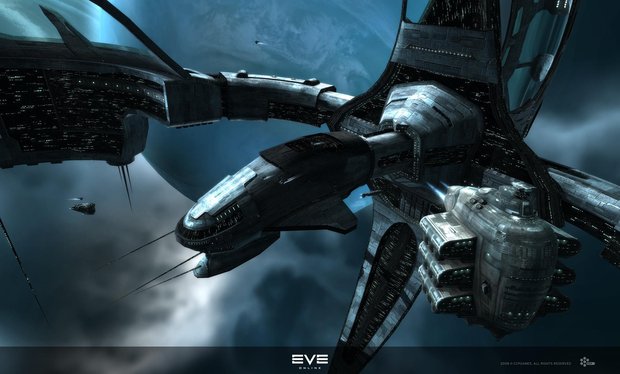Sponsored: Welcome To New Eden - Tips and Tricks for EVE Online Newbies
Welcome to New Eden! EVE Online is not your run-of-the-mill sword and sorcery MMO--in this science fiction universe, player interactions power the storyline. Starting out can be challenging, but we’ve got some tips to help get you on your feet! We’ll assume you're at least slightly familiar with the vocabulary of EVE (you should know what a “jumpgate” is, etc.), but we’ll avoid going over the deeper jargon--you’ll pick that up in no time as you play.

Join a Corporation: EVE is a social game and if you’re trying to play it alone, you’re going to encounter some barriers you wouldn’t have to deal with otherwise. Consider joining a Corporation--EVE's equivalent to guilds. Wingmen can help you out in a fight, they’ll tip you off to valuable resource deposits, and generally they’ll make your life easier. Corporations like Brave Newbies Inc., EVE University, and Red Vs. Blue are dedicated to helping new players get their feet under them, so join up and don’t be afraid to ask for help. New Eden can be a scary place, but you don’t have to face it alone!
Sec Status matters: Each system in New Eden is assigned a numerical “security status” ranging from 1.0 to -1.0. This number gives you an idea of the relative safety of that system. High Security (“hisec”) systems range from 1.0--0.5, and are protected by CONCORD, a sort of police force. If you attack another player in hisec, you might be attacked by CONCORD, or even other players. In low security (“lowsec”) systems, running from 0.4-0.1, you are not protected by CONCORD, so you should assume that every ship that is not part of your corporation or alliance might attack you. This is doubly true for any system with a sec status of 0.0 or lower (“nullsec”), where players are freed from the restrictions that protect hisec and lowsec--you won't have to worry about warp-denying interdiction bubbles in lowsec, for example. Wherever you are, never forget that sec status is only a measure of relative safety. You’re potentially at risk from the moment you undock, even in a 1.0 system.
Getting Started in hisec
Finish the tutorials: Yes, all of them. It’s a lot of reading and task-based missions, but completing EVE’s tutorials will give you a solid base from which to build. Not only do they teach you EVE’s controls and introduce you to some of the available professions, they’ll also reward you with the ships, ISK (money), weapons, and ammo you’ll need to move forward.
If you finish the tutorial missions but still want a bit of direction, start thinking about running missions for Agents. A particularly good series is the “Sisters of EVE” Epic Arc. Beginning in the Arnon system, this set of missions expands on the tutorials while providing a bit of a gentler learning curve for new players. Actually, there are plenty of missions that you can run to improve your standing with Factions. Dedicated mission-runners can solo Level 1 missions in small frigates or destroyers. If you want to go for higher level missions you’ll either need more powerful ships or a few friends in tow.

Plan Ahead: Once you’ve got some flight time under your belt, you can start thinking about how you want to spend your time in EVE. Want to play the markets? Want to mine? Want to destroy innocent miners? Each of those decisions utilizes a different skillset, and if you want to head quickly to compete in a specific one, you’ll need to specialize. The good thing about EVE is that you can eventually move to train other skills so you aren’t locked into a "class". Planning your skill training out for a few days or weeks ahead ensures you get the most return for the time. Make sure you consider each skills multiplier, which looks like this: “Caldari Frigate (x2).” The higher that number, the more you’ll need to consider whether a particular skill will advance you in your chosen profession. While many (x1) or (x2) skills like “Spaceship Command,” and “Drones” are often useful for every profession, there’s no need to train “Mining Foreman” unless you think you’ll be spending a lot of time in mining fleets.
One way to help speed up your training time is to get a hold of some shiny implants for your current clone. It won’t make a huge difference at first, but implants can save significant time on longer training projects.
Sign up to the GamesRadar+ Newsletter
Weekly digests, tales from the communities you love, and more
Learn the tools of the trade: There are a ton of tools that can help you navigate EVE Online outside of the game client. If you need to plan a route head over to DOTLAN, a fantastic map service that provides invaluable information. Considering a new ship fitting but don’t want to pony up the cash in game? The EVE Fitting Tool (EFT for short) is a free tool to help you work out the best new loadout. EVE-Central will help you work the markets. Learning to use these tools effectively can help you reach your goals is less time.
There are even some great mobile apps that combine all of these features. iPhone users might want to consider Neocom, an excellent app that does just about everything you could ever want. Android users get the same features with Aura. These tools and apps will even be automatically personalized to show your EVE characters--one of the unique features of EVE is the ability to generate API keys, allowing you to share your character’s information safely with outside parties.
Fix your Overview: The overview is the single most important piece of EVE Online’s UI. The default overview is serviceable, but for best results you’ll have to give it a tune up. Starting players will get a lot of mileage out of the free “Sarah’s Upgrade Pack,” which you can find via Google (download at your own risk!). Once you get a bit more space time under your belt, you’ll know what modifications you want to make and can start tweaking it to suit your needs.
Don’t rush to bigger ships: You might think it’s a good idea to train for big expensive ships but you’ll be setting yourself up for agony. It’s very important to train the foundational skills before moving up to a bigger ship class. Stick with frigates and destroyers until you’re sure you’re ready for the bigger guns. Not only will you be more useful to your wingmen, you won’t bankrupt yourself. Frigates are cheap--cruisers are not.
That’s not to say you shouldn’t treat yourself to some bling every now and again. If you’re feeling ritzy, go ahead and nab some of the limited edition ships. They’re unique, unusual, and help you stand out from the crowd.
Never undock in a ship you can’t afford to lose: You’ve been playing for a while now, and by saving your money you scraped up just enough money to afford a fancy new ship. You’ll want to take it out for a spin. Resist that urge at all costs. Nothing in the world will make you hate the world in general like watching 60% of your net worth go up in flames because some pirate in a cheap frigate got the drop on you. As a general rule: if you can’t afford to replace a ship three or four times over, leave it in the station.
Keep your friends close: EVE players are a friendly bunch, but there are some unscrupulous players out to scam newbies. Most of these can be sniffed out with common sense. There’s no easy way to make ISK in EVE--if something seems too good to be true, it probably is. Be especially wary of “permits” for mining rights or corporate “recruitment fees.”
This rule even extends to people you think are on your team. Timely betrayals can alter the course of history for thousands of players. Newbie-friendly corporations like Red v. Blue and Brave Newbies are a good bet for finding low key players who are more interested in blowing each other up than interstellar espionage. Have fun, and make friends, but remember: never undock in a ship you can’t afford to lose!
Venturing out of hisec
Losec and nullsec offer greater opportunities for the adventurous player. You can mine more valuable ores and find more valuable items at exploration sitesbut it comes with greater risks. Without CONCORD’s policing efforts, pirates can and will attack players travelling on their own. The pirates are the cats, and you’ll have to learn to be a better mouse if you want to avoid them.

D-scan saves lives: Once you leave hisec, you’ll have to learn a number of new skills to keep yourself safe, but one of the most important is the Directional Scanner (D-scan for short). D-scanning serves different purposes, depending on how wide you set the scanning angle. Set to 360 degrees, D-scanning warns you what ships are in the area immediately surrounding your location. At lower angles, D-scanning allows you to scout an asteroid field or jumpgate before warping to it. Learn to use this valuable tool--it will save your ship. Keep in mind that D-scan’s max range is limited to 2,147,483,647 meters, or about 14 AU. Beyond that, you’re blind.
Local Chat is an invaluable tool: Local chat reveals exactly who is in the same system as you are. Always keep an eye on Local--unless you are alone in a system, you are not safe. However, remember that there is no local chat in wormhole space--always assume a wormhole is hostile territory.
Plan your Routes: Your starmap is another wonderful tool if you want to stay alive. Different settings provide invaluable intel about New Eden. Look for the “Statistics” folder, and always pay attention to “Ships Destroyed in Last Hour,” “Escape Pods Destroyed in Last Hour,” and “Average Pilots in Space in Last 30 Minutes.” You can use that info to see where there are active battles, find empty systems to play around in (relative) safety, or to find populated systems if you’re feeling bloodthirsty.
Safespots and Perches: If you’ve ever got a spare moment in a system, consider placing a “safespot” by creating a bookmark while you’re in warp. You’ll be able to flee to that bookmarked location if you get in trouble. It will take your attackers time to locate your safespot--time you can use to make your escape.
A perch, on the other hand, is a bookmark you can warp to that overlooks a station, gate, or asteroid belt. To create one, warp to the object in question, then fly directly away from it for about 200-250 km distant. This “perch” allows you to see any hostiles near the gate/station/belt while keeping you out of targeting range.
Crashing the Gate: One of the biggest dangers for new players moving from hisec is gatecamps. Small bands of players will congregate around the jumpgates into and out of each system, waiting for players to pass through so they can be destroyed. Here’s the good news: You can take steps to help ensure you arrive safely at your destination. The bad news? Despite doing everything correctly, sometimes you’ll still get caught in the campers web
You’ll have to use all the tricks you’ve learned so far if you want to avoid gatecamps. Plan your route to avoid obvious chokepoints, which are more likely to be camped, and check for “hot” systems along your route--a lot of destroyed ships in a system is a good hint that one of the gates is camped.
Nullsec gatecamps are especially dangerous because the campers can use “interdiction bubbles,” trapping any ship within the bubble’s radius. But don’t panic--you can avoid them by approaching the gate from unexpected angles. As a general rule never warp from gate to gate in nullsec--you’ll warp straight into the camper’s bubble. Instead, chose a random planet, moon, or asteroid belt and warp there first. If possible, try to get within 14 AU of the gate in question, so you can use D-scan to investigate the area around the gate without putting yourself at risk.
Ask for help: EVE’s playerbase is--contrary to what you may have heard or read--actually one of the friendliest out there. While you’re just starting out, feel free to ask for help in the Rookie chat, where other players will usually answer your questions within a few seconds. Got ambushed and destroyed by other players? Send one of the other players a message and ask them what you could have done to avoid them--they’ll usually be happy to explain what you could have done differently. Ask for help, and ye shall receive it.
Have fun: Here’s the thing you need to understand about EVE: even if you do everything right--even if you’re almost perfect--you’re still going to die. And that’s okay. Your consciousness will be transferred to a new clone, and you’ll be flying again in no time flat, making your characters essentially immortal. Dying and the risk of loss are huge parts of what makes EVE Online the enthralling experience that it is. Just lost a fancy, expensive ship? Don’t sweat it!. EVE’s just a game--make sure you’re having fun. Fly safe!
The article you just read was sponsored and paid for by CCP Games.


